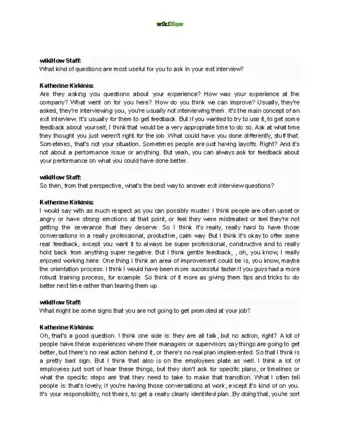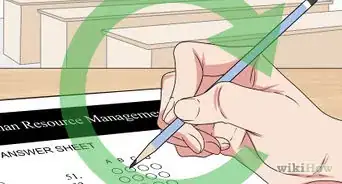This article was co-authored by Katherine Kirkinis, Ed.M., MA. Katherine Kirkinis is a Career Coach and Psychotherapist who has served as a career expert for Forbes, Medium, Best Life, and Working Mother Magazine, and as a diversity and inclusion expert for ATTN and Quartz. She specializes in working with issues of career, identity, and indecision. She has doctoral-level training in career counseling and career assessment and has worked with hundreds of clients to make career decisions through career assessments. She is pursuing a doctoral degree at The University of Albany, SUNY where her work focuses on diversity and inclusion, racism in the workplace, and racial identity. She is a published author and has been featured in academic journals as well as popular media outlets. Her research has been presented at 10+ national APA conferences since 2013.
There are 12 references cited in this article, which can be found at the bottom of the page.
wikiHow marks an article as reader-approved once it receives enough positive feedback. In this case, several readers have written to tell us that this article was helpful to them, earning it our reader-approved status.
This article has been viewed 98,687 times.
As an office manager, you'll be responsible for all activities, projects, and employees inside of your office. This requires you to possess superior organizational, leadership, and problem-solving skills and is a big responsibility that shouldn't be taken lightly. Luckily, with the right education, experience, and knowledge, you can become an office manager and thrive in the position.
Steps
Performing Daily Tasks
-
1Keep a clean office. As the office manager, the cleanliness and safety of the office and your employees are your responsibility. This means getting an outside maintenance company to regularly clean the office or working with an internal cleaning crew to keep things clean.[1]
-
2Answer phone calls and respond to emails and voicemails. One of your main responsibilities as an office manager will be to answer and respond to customer and client phone calls. This means taking messages and delivering the messages to the appropriate people in your office. It will also mean answering questions and solving problems for the rest of your internal office staff.Advertisement
-
3Recruit and onboard new employees. As an office manager, it may be your responsibility to interview and recruit new employees. If you have to do this as part of your responsibilities, it's important that you build a process and get all the necessary paperwork signed and filled out by new hires. It might also be your duty as an office manager to train new hires and get them acclimated to the office.[2]
-
4Maintain an office budget. You may be tasked with creating and maintaining an office budget. This can range from simple office supplies like ink, paper, and pens to more complex expenses like payroll, utilities, equipment, and money for office design upgrades.[3] Think of all of your potential expenses throughout the year and come up with a realistic estimate of how much everything will cost.
- You can ask to see previous year's budgets to understand what yours should consist of.
-
5Handle customer complaints and comments. If there is a serious customer complaint, you may have to resolve it. When you do get feedback from clients, it's also important that you communicate it to the other departments in your office so that they can adjust their operations accordingly. If you see a reoccurring complaint, you know it's a common problem that may need greater action, like a change in the way you do things.
-
6Create emergency procedures and follow regulations. Another way to ensure office safety is by making sure that everything is up to code and that there are no healthy or safety hazards in your office. If there are no emergency procedures in place in case of an emergency like fire or flood, you should work with management to develop them. You may also be tasked with training employees on how to evacuate the building and stay safe in case of such an emergency.
Building Useful Skills
-
1Develop stellar communication. To be a good office manager, you'll need to develop clear and concise written and verbal communication in your office. As the leader, people will be looking up to you to set the standards for communication. Make sure that all of your commands are clear and try to be as detailed as possible when giving people instructions.[4]
- Good communication also means being clear and concise in emails. Avoid shorthand and be detailed in your emails.
- Miscommunication between employees can create chaos and hurt your offices' productivity. Step in when employees have disagreements and resolve the problem.
-
2Be able to adapt and multitask. Being agile and goal-oriented will help you as an office manager. Often, you'll be involved with multiple departments and could be contributing to more than one project at once. Roll with the punches and be ready to problem-solve any issues that your team might come across. As office manager, you'll need to drive your team to the end goal and that means dealing with any unexpected problems that could arise.[5]
- Don't get bogged down and frustrated because it will set the mood for the rest of the office.
- Handle one thing at a time and troubleshoot issues as they come.
-
3Stay organized. It's important that all of the projects that you're involved in stay separated and organized because you'll most likely take part in multiple projects simultaneously. As the manager, people will be relying on you to properly archive information and manage it in a way that is transparent to the other people working on the project. Keep good records, log everything you can, keep lists of what you need to do, and make sure that your staff has access to the information they need.[6]
- Each project should have a dedicated folder and sometimes contain subfolders so that you can quickly and easily access information.
-
4Keep a calm, positive attitude. A good office manager is calm under pressure and is constantly a source of motivation to their employees in the office. The more volatile your management style, the more chaotic the office will be. Keep a professional demeanor when it comes to your employees and clients, and be there for employees that need help or motivation.[7]
Getting the Right Education and Experience
-
1Graduate high school or get your GED. Typically, office manager positions require a minimum of a high school degree or a GED. If you want to be an office manager, make sure that you graduate high school first or take a course to get your GED.[8]
-
2Attain a higher degree. If you want to improve the chances of getting considered, an associate or bachelor's degree in business administration will make you stand out. If you want to be an office manager in a highly specialized or technical industry, a bachelor's or master's degree in that industry will vastly improve your chances of getting the job.[9]
-
3Get experience working in an office. Many office managers start as administrative or office assistants. To improve your chances of landing an office manager job, try to get experience ordering supplies, assisting another office administrator, doing customer service, performing facilities maintenance, or managing a team. These skills will transfer to an office manager role.[10]
Getting the Job
-
1Talk to your HR department to get promoted to office manager. If you already work in an office and there's a vacancy for an office manager position, you should schedule a meeting with HR and see if you can apply for the job. Some companies would rather hire office managers internally and this can be the opportunity you need to get your foot in the door.[11]
-
2Search online for job openings. Look at popular job boards and search for office manager positions. Try to find positions in industries that you already have experience in to maximize the chances of landing the job.[12]
-
3Submit your application and resume. Your resume should highlight any professional skills that you have and any technical, organizational, or administrative skills that you possess. Experience maintaining office equipment like database systems, computers, printers, and phones will come in handy.
- Analytical, finance, organization, and management skills are also beneficial for an office manager.
- Think of times when you had to organize and manage people in school projects if you don't have professional experience.
-
4Go on interviews. When you interview, you'll likely be asked about your conflict resolution, organizational, and financial skills. Be ready to answer any applicable questions that could be thrown your way and make sure to emphasize your administrative knowledge and skill.[13]
- If you're interviewing for an office manager in a highly technical field like medicine or engineering, be ready to answer any technical questions that may be thrown your way.
- Make sure to do your homework before the interview by doing plenty of research about the organization, role, interviewer, and anything else about the job that you aren't super well-versed in.
Community Q&A
-
QuestionHow can I communicate well?
 Community AnswerBe kind. Speak to others with respect. Enunciate your words, and communicate confidently.
Community AnswerBe kind. Speak to others with respect. Enunciate your words, and communicate confidently. -
QuestionI'm the new office manager. The previous manager was everyone's best friend so they don't like me and do not want to cooperate. How can I win them over?
 Community AnswerJust lead by example. It's understandable that there may be some initial prejudice because you're a new employee, but this will wear off over time as long as you're a good office manager.
Community AnswerJust lead by example. It's understandable that there may be some initial prejudice because you're a new employee, but this will wear off over time as long as you're a good office manager. -
QuestionCan I have an example of division of duties?
 Community AnswerThe person who requisitions the purchase of goods or services should not be the person who approves the purchase.
Community AnswerThe person who requisitions the purchase of goods or services should not be the person who approves the purchase.
Expert Interview

Thanks for reading our article! If you'd like to learn more about being an office manager, check out our in-depth interview with Katherine Kirkinis, Ed.M., MA.
References
- ↑ https://www.forbes.com/sites/hesterlacey/2014/06/13/10-tips-for-creating-an-engaging-office-space-on-a-budget-hint-forget-the-slide/#61b54fa12f3e
- ↑ https://welcome.mit.edu/managers/before
- ↑ https://www.forbes.com/sites/hesterlacey/2014/06/13/10-tips-for-creating-an-engaging-office-space-on-a-budget-hint-forget-the-slide/#741dc652f3ec
- ↑ http://www.associatedegreeonline.com/2016/05/5-things-you-need-to-be-a-successful-office-manager/
- ↑ https://blog.getkisi.com/3-tips-for-being-a-rockstar-office-manager-during-an-office-move/
- ↑ http://www.snacknation.com/blog/how-to-be-a-good-office-manager/
- ↑ http://www.remodeling.hw.net/business/leadership/victoria-downing-what-makes-a-great-office-manager
- ↑ http://www.snagajob.com/job-descriptions/office-manager/
- ↑ http://learn.org/articles/Office_Management_How_to_Become_an_Office_Manager_in_5_Steps.html
About This Article
To be an office manager, work on developing excellent organizational skills since you'll be responsible for keeping records and maintaining a clean, organized office. Also, make sure you have great verbal and written communication skills, which will help you be an effective leader and communicate with your employees. As an office manager, you'll be working with multiple departments and dealing with a variety of projects, so work on being able to adapt to new situations and multitask effectively. To learn how to get the right education and experience to be an office manager, scroll down!














































































